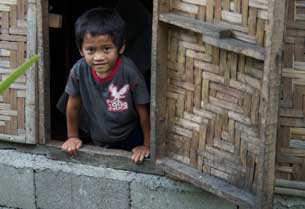The article can also be seen on the Primate’s World Relief and Development (PWRDF) website.
On November 8, 2013, every single home in barangay (village) Sabang Bao on the island of Leyte, Philippines was damaged or destroyed by Typhoon Haiyan. Many of the affected families have received aid from various agencies to rebuild their homes on their land, and life is slowly getting back to normal.
For other families, there is a problem. They don’t own land.
So even for the NGOs who have funding to build houses for those who lost everything in the storm, there is nowhere to build. They are tenant farmers, living on and working land owned by someone else- someone who doesn’t live in the community or sometimes even the country.
PWRDF partner the Episcopal Church in the Philippines has come up with one way of dealing with this problem. They have purchased a hectare of land from a resident in Sabang Bao, and are now working with tenant farmers to build 80 houses on the land. The families are working with an engineer to prepare the land, make compressed earth blocks to build with , and to build the houses for themselves and their neighbours. Working together, a dozen villagers can build a house for one of their number in less than a month.
The compressed earth blocks being used in the construction are a new technology to the people of Sabang Bao. “At first, people were unsure about using the blocks,” said Lennon Jake Bay Bay, the engineer working on the project, “but now they are getting interested.” The blocks are made from materials that are easily available locally, so are cheaper and more environmentally friendly to produce than the hollow blocks used previously.
ECP’s development program operates on the concept of “receivers to givers.” This means that ECP doesn’t generally just give people money for projects, but expects the money to be repaid over time, and that money is then used in new communities to provide even more people with a leg up. But after Typhoon Haiyan, ECP was tempted not to enforce the receivers to givers program. According to an ECP report, “With the massive destruction of communities in Central Philippines caused by the super-typhoon, it had seemed insensitive and inappropriate to talk about… the “receivers-to-givers” scheme with communities whose livelihoods have been almost completely wiped out.”
ECP staff were surprised when the scheme was enthusiastically accepted by the farmers of Sabang Bao. “What the staff have later come to realize was that, as stated above, many of the participating households are tenants who have never owned a piece of real property in all their lives and this project offered them what they considered to be a golden opportunity to own land for the first time.”
Thanks to the support of PWRDF and ECP, these 80 families in Sabang Bao have the opportunity to significantly improve their lives with dignity and through their own hard work after a storm that had destroyed all they had.
The most recent report from ECP is available here.
The Anglican Alliance have also added their name to a statement calling for climate justice, one year after the devastation of Typhoon Haiyan. It says, “As we mark the anniversary of Typhoon Haiyan and honor the memories of our families, relatives and friends, we resolve to continue to build people’s resilience against climate change through solidarity. We vow to fight for climate justice, and build a new system based on the rational, collective, and democratic management and use of resources in the interest of the people and the well-being of the planet.”
In the picture: a young boy in Sogod, Philippines, in October 2014
Credit: Simon Chambers, PWRDF

